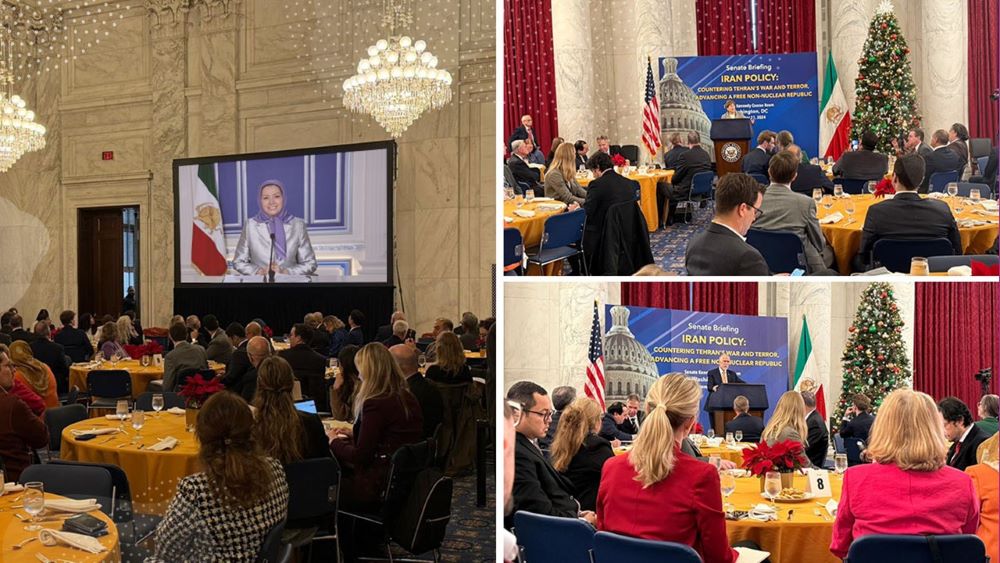
Highlights of a bi-partisan senate briefing, held on December 12, 2024. Mrs. @Maryam_Rajavi the @iran_policy president-elect, was the keynote speaker of this event.
Other speakers of this important briefing include: @SenTedCruz, @SenatorShaheen, @SenThomTillis, & @CoryBooker.… pic.twitter.com/CT9uwtRDeR— SIMAY AZADI TV (@en_simayazadi) December 12, 2024
Key Speakers and Their Remarks
Maryam Rajavi the President-elect of the NCRI
Mrs. Maryam Rajavi began by underscoring the clerical regime’s weakening position, pointing to strategic defeats in Syria and setbacks for Hezbollah in Lebanon. “The world witnessed how Assad’s heavily armed forces and tens of thousands of Quds Force proxies melted like snow under the summer sun,” she said, drawing a parallel to the potential collapse of the Revolutionary Guards in the face of nationwide uprisings in Iran.
Describing the regime’s Supreme Leader Ali Khamenei as a “strategic loser,” Mrs. Rajavi criticized his turn to Middle East wars as a diversion from domestic crises. “Such wars are the last resort of dictatorships on the brink of collapse,” she remarked, asserting that the strategy had backfired and intensified the regime’s vulnerabilities.
Mrs. Rajavi called for a policy shift from appeasement to accountability, emphasizing the importance of recognizing the Iranian people’s right to overthrow the regime. She stressed that “the correct and viable solution is the overthrow of this regime by the people of Iran and the Iranian Resistance.”
The NCRI President-elect highlighted the progress of the Resistance Units, which have carried out thousands of activities across Iran, despite severe repression. She also pointed to the issuance of death sentences for nine supporters of the People’s Mojahedin Organization of Iran (PMOI/MEK) as evidence of the regime’s fear of the resistance.
Mrs. Rajavi detailed the NCRI’s roadmap for regime change, which includes a provisional government to oversee free elections for a Constituent Assembly within six months of the regime’s fall. She emphasized that “the existence of a competent alternative leaves no room for chaos,” adding that the NCRI’s platform upholds equality, religious freedom, women’s rights, and a non-nuclear Iran.
Mrs. Rajavi’s closing remarks highlighted the stakes for the international community: “The world must stand with the Iranian people and their fight for freedom. This is not just Iran’s battle; it is a fight for justice, democracy, and peace.”
Video—Maryam Rajavi’s Vision: A Free and Democratic Iran – US Senate Gathering, 11 Dec 2024
Ambassador Marc Ginsberg
- Historical Context: Reflected on his experience with Senator Kennedy and emphasized the need for bipartisan foreign policy.
- Regime’s Inability: Described the Iranian regime as weakened and incapable of meeting its people’s needs.
- Call to Action: Urged international action against the regime and praised Rajavi’s leadership in galvanizing opposition.
Senator Thom Tillis
- Commended contributions from ambassadors and military leaders, emphasizing the fight against tyranny.
- Criticized Iran’s leadership for betraying its heritage and praised Rajavi’s vision for a peaceful transition.
- Urged stronger actions against Iran, calling for bipartisan support for Senate Resolution 599.
Senator Jeanne Shaheen
- Highlighted signs of weakness in Iran’s leadership linked to recent developments in Syria.
- Praised the resilience of Iranian Resistance members and called for support of their right to self-determination.
Senator Ted Cruz
- Delivered a powerful speech on reinstating the “Maximum Pressure” policy against Iran.
- Criticized Khamenei’s leadership and vowed to enforce sanctions rigorously if he returns to office.
Senator Cory Booker
- Emphasized shared commitments to justice and democracy, framing Iran’s oppression as an American problem.
- Advocated for bipartisan action and protection of Iranian dissidents.
General Keith Kellogg
- Stressed the necessity of applying unrelenting pressure on Iran, reflecting on past U.S. policy failures.
- Highlighted successes from the Trump administration’s “Maximum Pressure” campaign.
General James Jones
- Destabilizing Role of Iran: Jones referred to the Iranian regime as “the head of the snake,” responsible for supporting groups like Hezbollah and Hamas, and noted that recent events in Syria demonstrate that change is possible in the Middle East.
- He firmly rejected any form of appeasement towards Iran, stating, “Appeasement does not work. Full stop.” He called for a renewed U.S. policy combining sanctions with active support for the Iranian opposition.
- He praised Maryam Rajavi’s Ten-Point Plan as “Jeffersonian in principle” and suggested it should be included in a future constitution for Iran.
- Call to Action: In conclusion, Jones urged for public education about the National Council of Resistance of Iran (NCRI), tightening sanctions on Iranian oil exports, and reaffirming U.S. commitment to preventing Iran from acquiring nuclear weapons, emphasizing that hope for change must be instilled in the Iranian people.
Senator Sam Brownback
- Warned about Iran’s nuclear ambitions and called for robust action against its oppressive governance.
- Emphasized support for Iranian opposition groups as vital in combating Tehran’s destabilizing tactics.
Ambassador Mohammed A. Al-Hadhrami
- Addressed Yemen’s suffering as a result of Iranian influence through proxies like the Houthis.
- Proposed a three-point strategy to counter this threat, including designating Houthis as terrorists and supporting Yemeni forces.
The event underscored a unified front among U.S. lawmakers and leaders advocating for change in Iran, emphasizing that international support is crucial in aiding the Iranian people’s struggle for freedom.